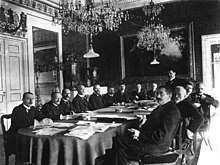Ulrich Rauscher
Ulrich Karl Paul Rauscher (born June 26, 1884 in Stuttgart , † December 18, 1930 in St. Blasien ) was a German journalist, author and diplomat.
Life

Rauscher studied law and had been a member of the Corps Suevia Heidelberg since 1906 . He later worked as a correspondent for the left-wing liberal Frankfurter Zeitung in Strasbourg and Berlin . He was one of the first to write about cinema as a propaganda tool. He also wrote for the Schaubühne (later called Die Weltbühne ). At times he was a close colleague of Siegfried Jacobsohn .
After 1914 he worked in the war press office and in the political department of the German General Government in Belgium and a proponent of a policy of annexation with regard to Belgium. He was the driving force behind the so-called German National Committee, an externally independent body, but actually a propaganda agency for the government. Between 1917 and 1918 he was a sergeant on the Western Front.
Presumably in 1918, Rauscher joined the SPD . In November and December 1918 he was Philipp Scheidemann's personal advisor . From the beginning of January 1919 he was press chief of the Reich Government and between October 1919 and June 1920 he was head of the combined press department of the Reich Government and the Foreign Office. At the beginning there were protests against the appointment of Rauscher on the part of the workers 'and soldiers' councils because he had supported the German occupation policy in Belgium. During the Kapp Putsch in 1920, Rauscher drafted the joint call for a general strike by the Reich President, the Social Democratic ministers and the Social Democratic parliamentary group in the Reichstag. Theodor Heuss , who referred to Rauscher as a friend and compatriot in his memoirs, and others later claimed that Rauscher took this step alone. In view of the importance of the step, the historian Peter-Christian Witt thinks it is unlikely that Rauscher could have done this without consulting Reich President Friedrich Ebert and Reich Chancellor Gustav Bauer . Heinrich August Winkler occupies a middle position in this matter. For him it is certain that at least Gustav Noske and Otto Wels knew and approved the text before it was published. On the other hand, Bauer, Ebert and the other ministers were not informed.
From 1920 Rauscher was German envoy, first in Georgia and from 1922 until his death in Poland . He was one of the few diplomats who came to the Foreign Office from other professions after the war . A close personal relationship and similar attitudes towards anti-Polish hostility during the Weimar Republic connected him with the head of department in Department IV of the Foreign Office, Willi Noebel (1887–1965). During his tenure in Warsaw, he criticized the anti-Polish reservations and spoke out in favor of good neighborly relations. For him, too, the focus was on German interests. The main requirement of our Poland policy must be, "No resentment, but the coolest interest policy." He played a key role in bringing about the German-Polish liquidation agreement. During his time in Poland, Rauscher was also one of Gustav Stresemann's closest confidants and was at times his liaison with Friedrich Ebert.
literature
- Armin Danco: The Yellow Book of the Corps Suevia zu Heidelberg, 3rd edition (members 1810–1985), Heidelberg 1985, No. 888
- Ulrich Rauscher . In: Franz Osterroth : Biographical Lexicon of Socialism . Deceased personalities . Vol. 1. JHW Dietz Nachf., Hanover 1960, pp. 245–246.
- Wolfgang Elz: Rauscher, Ulrich Karl Paul. In: New German Biography (NDB). Volume 21, Duncker & Humblot, Berlin 2003, ISBN 3-428-11202-4 , p. 211 f. ( Digitized version ).
Individual evidence
- ^ Kösener corps lists 1910, 121 , 915
- ↑ Freytag, Dominik Petzold (ed.): The "long" 19th century: Old questions and new perspectives 2007 p.202
- ↑ So z. B. in an editorial in the Vossische Zeitung of January 5, 1917 (morning edition), No. 7.
- ↑ Wolfgang J. Mommsen: Max Weber and German Politics 1890-1920. 2004 p. 256
- ↑ Gerhard Engel , Bärbel Holtz, Ingo Materna: Großberliner Arbeiterräte. 1993, p. 217
- ^ Theodor Heuss: Memoirs 1905-1933 p.195
- ^ Peter-Christian Witt: Friedrich Ebert: Party Leader - Reich Chancellor - People's Representative - Reich President, Bonn 1987, Verlag Neue Gesellschaft, ISBN 3-87831-446-9 , p. 146
- ^ Heinrich August Winkler: Weimar 1918-1933. The history of the first German democracy. Beck, Munich 1993, ISBN 3-406-37646-0 , p. 122
- ^ Roland G. Foerster: Operation Barbarossa. 1993 page 28
- ↑ Rödder: Revisionism and Understanding ( page no longer available , search in web archives ) Info: The link was automatically marked as defective. Please check the link according to the instructions and then remove this notice.
- ^ Kurt Koszyk: Gustav Stresemann. The democrat loyal to the emperor. 1989 p. 287
Web links
- Literature by and about Ulrich Rauscher in the catalog of the German National Library
- Works by and about Ulrich Rauscher in the German Digital Library
- Newspaper article about Ulrich Rauscher in the 20th century press kit of the ZBW - Leibniz Information Center for Economics .
- Ulrich Rauscher in the online version of the Reich Chancellery Edition Files. Weimar Republic
- Walther Mühlhausen: Friedrich Ebert and the occupation of the diplomatic missions in the Weimar Republic (PDF file; 2.31 MB)
- Part of the article Rauschers: Das Kino (1913)
| personal data | |
|---|---|
| SURNAME | Rauscher, Ulrich |
| ALTERNATIVE NAMES | Rauscher, Ulrich Karl Paul (full name) |
| BRIEF DESCRIPTION | German journalist, author and diplomat |
| DATE OF BIRTH | June 26, 1884 |
| PLACE OF BIRTH | Stuttgart |
| DATE OF DEATH | December 18, 1930 |
| Place of death | St. Blasien |
